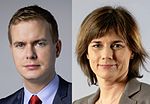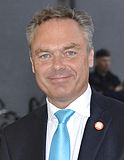2018 Swedish general election
| ||||||||||||||||||||||||||||||||||||||||||||||||||||||||||||||||||||||||||||||||||||||
All 349 seats to the Riksdag 175 seats are needed for a majority | ||||||||||||||||||||||||||||||||||||||||||||||||||||||||||||||||||||||||||||||||||||||
|---|---|---|---|---|---|---|---|---|---|---|---|---|---|---|---|---|---|---|---|---|---|---|---|---|---|---|---|---|---|---|---|---|---|---|---|---|---|---|---|---|---|---|---|---|---|---|---|---|---|---|---|---|---|---|---|---|---|---|---|---|---|---|---|---|---|---|---|---|---|---|---|---|---|---|---|---|---|---|---|---|---|---|---|---|---|---|
| ||||||||||||||||||||||||||||||||||||||||||||||||||||||||||||||||||||||||||||||||||||||
| ||||||||||||||||||||||||||||||||||||||||||||||||||||||||||||||||||||||||||||||||||||||
The next Swedish general election will be held in Sweden on or before 9 September 2018 to elect the members of the national law-making assembly, the Riksdag (Riksdagen).[1][2]
Electoral system
The Swedish Riksdag is made up of 349 MPs and all are elected through proportional representation on multi-member party lists that could be regional (most major parties) or national (Sweden Democrats). Each of the 29 constituencies has a set number of parliamentarians that is divided through constituency results to ensure regional representation. Then the other MPs are elected through a proportional balancing to ensure that the elected MP's accurately represent the votes of the electorate. The Swedish constitution (1974:152) 1 Ch. 4 § says that the Riksdag is responsible for taxation and making laws and the 1 Ch. 6 § says that the government is held responsible to the Riksdag. In other words, this means that Sweden has parliamentarism in a constitutional monarchy—ensuring that the government is appointed by the people's representatives and the Prime Minister is therefore indirectly elected.
Major parties
The Social Democratic Party (S; Socialdemokraterna) is the largest political party in the Swedish Riksdag, with 113 of the 349 seats. It is the major component of the incumbent Löfven Cabinet, working with the Green Party. Its current party leader Stefan Löfven has been Prime Minister of Sweden since 3 October 2014, and has said he will seek a mandate to continue his Löfven Cabinet. He said that he intended to call for an extra general election after his cabinet's budget was voted down by the opposition, the first extra general election since 1958. However the extra general election was 'cancelled' on 27 December 2014, two days before Löfven was to call it, following a budgetary procedure agreement with the Alliance.
The Moderate Party (M; Moderaterna) is the second-largest party in the Riksdag with 84 seats. It was the largest governing party under Prime Minister Fredrik Reinfeldt from 2006 to 2014. Reinfeldt resigned as party leader after eight years as Prime Minister. He was succeeded as party leader on 10 January 2015 by Anna Kinberg Batra. The party is involved in the Alliance, alongside three other parties, which will seek to return to power together. Her decision as de facto leader to enter the budgetary procedure agreement with the left-of-centre cabinet saw sharp disgruntlement from some party districts. The Alliance has more MPs than the government parties, but still finds itself in opposition.
The Sweden Democrats (SD; Sverigedemokraterna) is the third-largest party in the Riksdag with 49 seats. In the 2014 general election the party increased its share of seats by 29, becoming the third-largest party. The party leader is Jimmie Åkesson, who is the longest-serving party leader. The other Riksdag parties have repeatedly stated that they will not cooperate with the Sweden Democrats in a future government. The extra general election was called after the Sweden Democrats gave their support to the oppositional Alliance budget. After the cancelled extra election, the party advertised itself as the 'only opposition party' and in the following months it saw a sharp rise in the opinion polls (see below).
The Green Party (MP; Miljöpartiet) is the fourth-largest party in the Riksdag with 25 seats. The Green Party is the minor component of the Löfven Cabinet, alongside the Social Democrats. It is the only Swedish party to have two spokespersons, currently Gustav Fridolin (since 2011) who serves as Minister for Education, and Isabella Lövin (since 2016) who serves as Minister for International Development Cooperation. This will be the first time in Swedish history that the Green Party has had its governmental record tested at an election.
The Centre Party (C; Centerpartiet) is the fifth-largest party in the Riksdag with 22 seats. It was a part of the Reinfeldt cabinet from 2006 to 2014. The party has been led by Annie Lööf since 2011. The party is involved in the Alliance alongside three other parties which will seek to return to power together. The Centre Party was subject to public attempts by Löfven to become a cooperation party, but the party traditionally leans towards the Moderate policy positions and therefore stayed within the Alliance after the 2014 election.
The Left Party (V; Vänsterpartiet) is the sixth-largest party in the Riksdag with 21 seats. The current party leader is Jonas Sjöstedt. He has said that the Left Party seeks to participate in a future Red-Green coalition government. The party did not support the Löfven Cabinet because it was not asked to participate in his cabinet following the 2014 general election, but supported his budget that was voted down on 3 December 2014. Following the budgetary agreement the Left Party is what tips the left-of-centre minority into a larger minority than the Alliance.
The Liberals (L; Liberalerna) is the seventh-largest party in the Riksdag with 19 seats. It was a part of the Reinfeldt cabinet from 2006 to 2014. The party has been led by Jan Björklund since 2007. His leadership is being increasingly criticized within the party. The party is involved in the Alliance alongside three other parties which will seek to return to power together. Opinion polls in the year after the election suggests that the party is struggling to recapture its previous level of support. Having been in charge of the school system and integration of migrants, the party came under a lot of criticism due to falling school results and increased segregation in the immigrant-dominated suburbs.
The Christian Democrats (KD; Kristdemokraterna) has been led by Ebba Busch Thor since 2015. It is involved in the Alliance alongside three other parties which will seek to return to power together. According to opinion polls there is a significant risk that the Christian Democrats will fail to achieve representation in the next Riksdag. The party held on by a few tens of thousands of votes last time. The parliamentary presence of the Christian Democrats is seen as essential in order for the Alliance to be able to form a government.
Possible newcomer parties
The Feminist Initiative (FI; Feministiskt Initiativ) is the country's ninth-largest party and represented in the European Parliament following the 2014 European election. The party fell somewhat short of the 4% threshold to enter the Riksdag in the 2014 general election, but still got more than 3% of the vote. Led by former Left Party leader Gudrun Schyman, the party aims to enter the Riksdag in 2018; according to the opinion polls the party's popularity has been on the decline since the election, but still comfortably polling as the largest party outside the Riksdag.
Due to the 4% threshold it is difficult for smaller parties to enter the Riksdag. The Pirate Party (PP; Piratpartiet) won representation in the 2009-14 European Parliament but its subsequent runs for office have been less successful. It has been mentioned in some polls as the tenth-largest party, but appears to be far from having a chance to break the threshold at a domestic level.
2014 budget crisis
Prime Minister Stefan Löfven announced in the afternoon of 3 December 2014 that he intended to make the formal arrangements for calling an election on 29 December 2014—the earliest date permitted by the constitution.
The elections were called after the Social Democrat-led government of Löfven lost a vote on the budget by 182 to 153 owing to the Sweden Democrats voting with the opposition, leading to a cabinet crisis.[3] It would have been the first extra election since 1958.[4]
An agreement was signed on 26 December 2014 between the Social Democrats, Greens, Moderates, Centrists, Liberals and Christian Democrats, outlining a series of conditions in order to ensure political stability until at least 2022.[5] The agreement included two main provisions:
- The PM candidate who gathers the most support will be elected. This applies to both incumbent and new PM candidates.
- A government in minority will be allowed to have its budget passed, by the abstention of opposition parties who have signed the agreement.
After negotiations between the Government and the Alliance for Sweden concluded, the snap election was called off on 27 December 2014.
Opinion polls
References
- ^ "Sweden's Prime Minister calls fresh election". Retrieved 3 December 2014.
- ^ "Veckans Affärer". Veckans affärer. Retrieved 3 December 2014.
- ^ Sweden election called by Löfven after parliament defeat BBC News, 3 December 2014
- ^ "Just nu: Regeringskrisen fortsätter". SvD.se. Retrieved 3 December 2014.
- ^ Agreement









